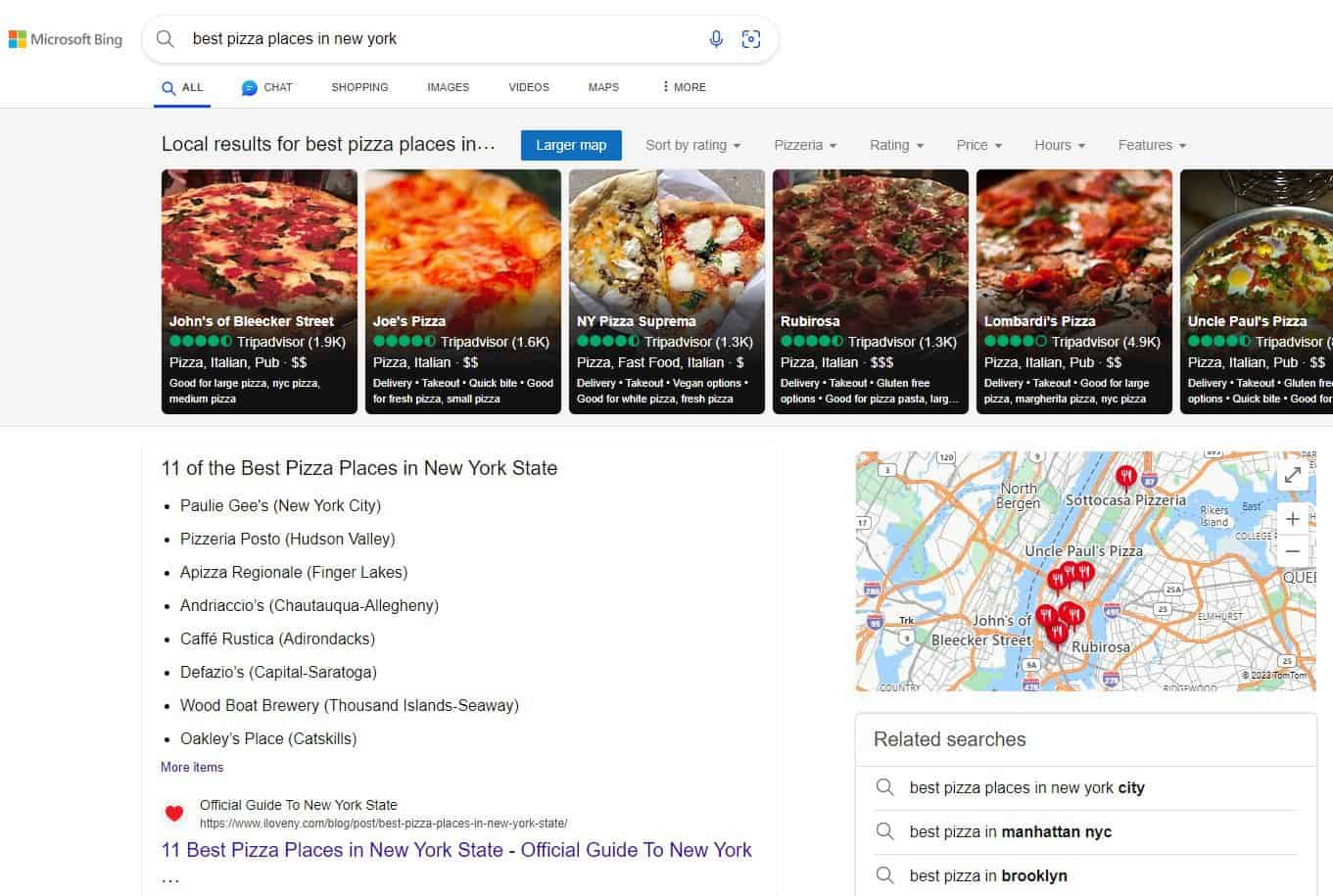“Bing sucks” – a phrase you’ve probably heard or seen more than once if you’ve spent any time on the internet. But before we delve into why this sentiment is so prevalent, let’s take a moment to understand what Bing is. Bing, launched by Microsoft in 2009, is a web search engine designed to compete with the industry giant, Google. It offers a variety of search services, including web, video, image, and map search products.
I personally think Bing is inferior to other search engines. Despite Microsoft’s best efforts, Bing has struggled to shake off the perception that it’s an inferior search engine. This perception isn’t without reason – users often cite poor search results, limited indexing, and a less intuitive user experience as reasons for their dissatisfaction. But what do these criticisms actually mean? Let’s break them down.
Here is a comparison of Bing with other top search engines (Google, Yahoo, Baidu, Yandex, and DuckDuckGo).
Search Engine |
Search Quality |
Indexing |
Misinformation |
User Experience |
Local Search |
Language Support |
|---|---|---|---|---|---|---|
Bing |
Less relevant |
Incomplete |
High misinformation |
Less intuitive |
Less effective |
Poor in non-English |
Google |
Highly relevant |
Comprehensive |
Lower misinformation |
Intuitive |
Effective |
Good in non-English |
Yahoo |
Similar to Bing |
Similar to Bing |
Similar to Bing |
Similar to Bing |
Similar to Bing |
Similar to Bing |
Baidu |
Chinese-focused |
Chinese-focused |
Unclear |
User-friendly in China |
Effective in China |
Chinese-focused |
Yandex |
Russian-focused |
Russian-focused |
Unclear |
User-friendly in Russia |
Effective in Russia |
Russian-focused |
DuckDuckGo |
Multi-source |
Depends on sources |
Depends on sources |
User-friendly |
Privacy-focused |
Good in non-English |
Reason #1 – Poor Search Results
To understand why Bing’s search results are often criticized, we first need to understand how search engines work. At the heart of every search engine are algorithms – complex sets of rules that determine which web pages are relevant to a user’s search query. These algorithms rely on an index, a massive database of information about web pages.
Bing’s algorithm, like all search engine algorithms, is a closely guarded secret. However, it’s generally accepted that Bing’s algorithm tends to prioritize different factors compared to Google’s. For example, Bing places a higher emphasis on social media integration, while Google focuses more on backlinks.
Let’s consider a real-life example. If you were to search for “best pizza places in New York” on both Bing and Google, you might notice some differences in the results. Bing might show you a list of popular pizza chains, while Google might show you a mix of popular chains and local favorites, ranked by reviews and ratings.
This difference in search results can be attributed to the different algorithms and indexing strategies used by Bing and Google. While Bing’s results aren’t necessarily wrong, they might not be as helpful or relevant to a user looking for a unique, local pizza experience in New York.
Poor search results can significantly impact user experience and satisfaction. If a user can’t find the information they’re looking for, or if they have to sift through irrelevant results, they’re likely to become frustrated and switch to a different search engine.

Reason #2 – Limited Indexing
Web indexing is the process by which search engines collect and store information about web pages. This information is then used to provide relevant search results. The more comprehensive a search engine’s index, the more likely it is to provide accurate and relevant search results.
Bing, like all search engines, uses automated bots known as web crawlers to index the web. These bots visit web pages, follow links on those
pages, and then send the information back to Bing to be indexed. However, Bing’s indexing has been criticized for being less comprehensive than other search engines. While Bing’s web crawlers are designed to index as many sites as possible, they may skip some sites. This could be due to a variety of factors, such as the site’s robots.txt file blocking Bing’s web crawlers, or the site not being linked to from any other sites that Bing’s web crawlers have visited.
Limited indexing can lead to less comprehensive search results. If Bing’s web crawlers haven’t indexed a site, then that site’s pages won’t appear in Bing’s search results, even if they’re relevant to a user’s search query. This can lead to users missing out on valuable information and having a less satisfying search experience.
Compared to other search engines, Bing’s indexing is often seen as less comprehensive. For example, Google’s web crawlers are known for their ability to index a vast number of web pages, leading to more comprehensive search results. This difference in indexing capabilities is one of the key factors contributing to the perception that Bing’s search results are inferior.
I hope this gives you a good starting point for your article. I’ve tried to keep the tone conversational and engaging, and I’ve included real-life examples and a storytelling approach where possible. If you need more content to reach your word count, feel free to ask for additional prompts!
Reason #3 – Misinformation
“Bing sucks” – again a phrase often heard in discussions about misinformation. But what exactly is misinformation? Misinformation refers to false or inaccurate information, particularly when it’s shared regardless of an intent to mislead. Disinformation, on the other hand, is deliberately misleading or biased information, manipulated narrative or facts, or propaganda.
Search engines play a crucial role in the spread and combat of misinformation. They are the gatekeepers of information, deciding what content reaches the user. When a user enters a query, the search engine’s algorithm determines what information is most relevant and presents it to the user. If the algorithm favors misleading or false information, it can inadvertently contribute to the spread of misinformation.
Several studies have suggested that Bing returns misinformation at a higher rate than other search engines. These studies typically involve entering a set of predetermined search queries into different search engines and then analyzing the top results for accuracy and reliability.
The findings of these studies have been concerning. They suggest that Bing’s search results often include more misinformation than those of other search engines. This could be due to a variety of factors, such as Bing’s algorithm favoring sensational or popular content over accurate and reliable information.
The spread of misinformation can significantly impact user trust and the reputation of a search engine. If users frequently encounter misinformation in their search results, they may lose trust in the search engine and switch to a different one. This can lead to a decline in user numbers and damage the search engine’s reputation.
Reason #4 – User Experience
User experience, or UX, is a crucial aspect of any technology product. It refers to a user’s overall experience when using a product, including how easy it is to use, how it makes the user feel, and how well it meets the user’s needs.
Many criticisms of Bing revolve around its user interface and features. Users often find Bing’s interface less intuitive and user-friendly than other search engines. For example, users have complained about Bing’s image search, which presents images in a collage format that some find confusing and difficult to navigate.
Compared to other search engines, Bing’s user interface and features often fall short. For example, Google’s clean and minimalist design is often praised for its ease of use and intuitive navigation. In contrast, Bing’s design is often seen as cluttered and confusing.
User experience can significantly impact user retention and satisfaction. If users find a search engine difficult to use or if it doesn’t meet their needs, they’re likely to switch to a different search engine. This can lead to a decline in user numbers and damage the search engine’s reputation.
I hope this gives you a good continuation for your article. I’ve tried to keep the tone conversational and engaging, and
I’ve included real-life examples and a storytelling approach where possible. If you need more content to reach your word count, feel free to ask for additional prompts!
Reason #5 – Brand Perception
Branding is a critical aspect of any technology product. It’s not just about a catchy name or a sleek logo; it’s about the overall impression that people have of the product. A strong brand can inspire trust, create an emotional connection, and ultimately drive user loyalty.
Bing’s brand has been a subject of much debate. Some users find the name “Bing” catchy and memorable, while others find it confusing or even silly. The logo, too, has been met with mixed reactions. Some appreciate its simplicity, while others find it uninspiring.
![]()
Compared to other search engine brands, Bing’s brand is often seen as less strong. Google, for example, has a brand that is universally recognized and associated with internet search. Its name has even become a verb in everyday language, a testament to its strong brand.
Brand perception can significantly impact user adoption and loyalty. If users have a negative perception of a brand, they’re less likely to use the product and more likely to switch to a competitor. This can lead to a decline in user numbers and damage the product’s reputation.
Again, I hope this helps with your article. Remember, the key to a great article is to keep it engaging, easy to understand, and unique. Good luck with your writing!
